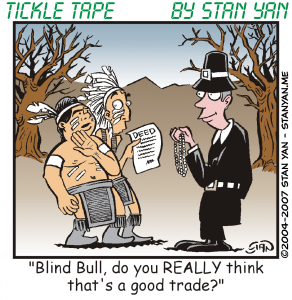Two common sayings worth following are “Accept what the markets give you” and “Don’t impose your will onto the markets.” As a dominant species, humans are used to controlling their environment. The strongest usually prevail, and the strong usually are able to completely control their physical and social environment and the people in it. In football, for example, an unbeatable team is able to control the line of scrimmage.
The opponent is stuck and forced to use a particular game plan, such as running the ball, even if they don’t want to. It’s all about power and control. It doesn’t quite work that way in trading, however. A trader can’t control what other market participants are doing or are going to do. Not only can’t traders control them, but it’s also often hard to predict what they are going to do. That’s why it is more useful to accept that you can’t control the market and figure out a way to work around it.
In the end, prices are based on the opinion of the masses, and opinions are difficult to gauge; they may fluctuate for no good reason. Consider stock prices of major U.S. retailers. Although they reported higher earnings for the third quarter this week, most stock prices are down. There are several fundamental forces that may be working, such as higher interest rates or the belief of some market analysts that higher profits are due to cost containment rather than an actual rise in sales.
But despite analysis of these factors, in the end, short-term traders must make an educated guess as to how market participants are going to react to analysts’ reports or the media coverage in general. You could look at a host of variables and plug them into a regression equation, but in the end, all that matters are people’s opinions. And people are inherently unpredictable. That’s why it is vital to understand that you can’t control the markets, and why you should make a clear distinction between what “should happen” from what actually does happen. Some might say that if profits of U.S. retailers are up, market participants should invest in these stocks and raise the price. But you can’t count on it.
First, who knows if market participants are listening to the news or if they even care? Second, who knows what will happen in the next two months during the Holiday season to change the outlook of U.S. retailers. Retailers have an optimistic outlook today, and they hope that consumers believe them, but no one knows what will actually happen. Just how confident is the average consumer these days? In the end, all you can do is make the best guess you can and stand behind it. You can never know for sure, and nothing is guaranteed. There’s only so much you can do. It’s best to limit your risk, make the trade, and see what happens next.
When trading, it is useful to realize that what “should happen” may not actually happen. If you believe you have more control than you actually do, you’ll be frustrated and disappointed when your expectations don’t pan out. It’s more useful to be sceptical, and consider the possibility that you are merely working with imperfect data in an imperfect world. The more you can accept what the markets have to offer, the calmer you’ll trade, and the more profits you’ll realize.


